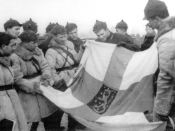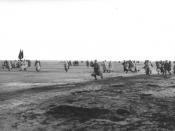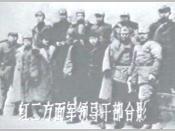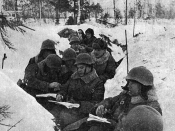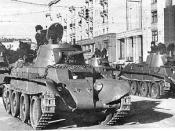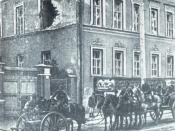Assess the view that the Red Army's victory in the Civil War was responsible for the establishment of power by 1924Whether the Red Army's role in the Civil War was vital for the Bolshevik consolidation of power is still debated by academics and historians alike. On one hand, it is argued that if the Red Army was not a disciplined force, the likes of Denikin and Wrangel would have assumed power in the Soviet Union. Furthermore, it is also argued that the collation of the Red Army provided the Party an expendable force that would maintain order in the nation such as that shown during the Kronstadt rebellion. However, on the other hand, it is also argued that it was not the actions of the Red Army but the social and economic policies adopted by the Party such as Lenin's first decrees, War Communism and NEP that led to the establishment of power.
Additionally, the establishment of CHEKA aligned the population by force to be behind the Party, which was essential in establishing power by 1924.
The Red army's victory in the Civil War was vital for the success of the Bolsheviks as a failed campaign would have ousted Lenin and his Party from political control in the Soviet Union. The Whites, Ukrainian nationalists and the anarchists were the major players involved in the anti-communist camp and according to McCauley lacked clear and decisive direction and leadership. However, Westwood argues that the opposition forces were capable as was seen in the 1919 Autumn campaign when Denikin's forces threatened Moscow and Petrograd. The White Army were by no means, according to Lunacharsky, a lacking fighting force. Lunacharsky further goes onto say that Lenin's approval of Tsarist military leaders to form the Military Council would have been unthought of in 1917 yet desperate means called for desperate measures. Lenin further directed all the nations' resources to the war through war communism as a Red Army success was vital for the establishment of power. Forced requisitioning of grain led to the Famine of 1921 yet at the time, according to McCauley; feeding the munition workers and the Red Army was imperative as Lenin believed a successful campaign would establish communist control.
Furthermore, the development of the rag tag Red Army to a discipline capable fighting force was vital for the Bolsheviks to control its population and protect its borders from external enemies. According to McCauley, the Red Army's victory brought with it a psychological victory for the Party as the rest of the world viewed the Bolsheviks as not as weak as once thought. Lunacharsky further goes onto say that, the establishment of a disciplined and capable fighting force allowed the commissars to turn its focus away from defence to establishing a communist framework for the economy, society and politics. In short, the success of the Red Army allowed the Party to establish and maintain its power up to 1924. Furthermore, after the Civil War, the Red Army was used as an expendable resource by the Party to establish its power over the population and maintain its control. This was seen as Trotsky directed the Red Army to quell the naval uprising in Kronstadt in 1921. By 1924, the Red Army was a reliable force that possessed the necessary power to control the population and maintain communist power as focus was turned away from defence to establishing communism in the Soviet Union.
www.wikipedia.comwww.encarta.com
